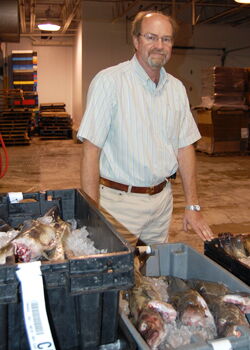As fish exchange struggles, industry again pushes for incentives
 Photo/Robert M. Cook
Bert Jongerden, general manager of the Portland Fish Exchange, says a lack of incentives has forced Maine groundfishermen out of the state
Photo/Robert M. Cook
Bert Jongerden, general manager of the Portland Fish Exchange, says a lack of incentives has forced Maine groundfishermen out of the state
Local fishery industry leaders say it's Maine's fault the state has lost so much of its groundfishing fleet to Massachusetts, forcing the Portland Fish Exchange and city officials to scramble to lure more landings.
Bert Jongerden, general manager of the fish exchange, maintains that the types of financial incentives offered to fishermen in the Bay State are desperately needed "to level the playing field" if Maine hopes to hold onto what's left of its groundfishing industry. Those include such measures as allowing them to sell lobster bycatch (the lobsters that get caught in the groundfishermen's nets) or passing a permanent rebate on the 5% diesel fuel tax.
The federal regulations, which have limited fishermen's days at sea since 2006, have certainly contributed to the decline, he says, but the lack of state incentives for fishermen to land their catches in Portland instead of Gloucester, New Bedford and Boston, Mass., has hurt just as much.
Landings at the fish exchange have dropped from 17 million pounds of fish in 2006 to 6.3 million pounds in 2009, and the fish exchange is on pace to see 4.5 million pounds of fish landings this year. The fishing fleet has declined from up to 40 vessels in 2006 to 15 to 20 vessels now, Jongerden says.
This summer, the fish exchange's landings have increased from 13,000 pounds in the first week of May to about 80,000 pounds per week during the month of June. The fish exchange and the city in July made an appeal to groundfishermen to land their catches in Portland to bring the exchange's landings over the 100,000 pounds per week mark, helping to reach a season high of 117,000 pounds during the week of July 19. Jongerden says the exchange, which opened in 1986, needs to see between 100,000 to 125,000 pounds of fish per week from now until the end of the year to earn enough revenue to stay operational.
"The exchange can be profitable, but we need a certain level of fish," Jongerden says, adding the exchange needs to see up to 8 million pounds of fish per year to be successful.
Maggie Raymond, president of the Associated Fisheries of Maine, which represents 30 groundfishermen, fished out of Portland with her vessel, the 80-foot Olympia, from 1989 to 2004 before fishing out of Boston. In Massachusetts, she earns an additional $100,000 per year in lobster bycatch revenue. She also saves $5,000 a year by not paying any diesel fuel sales tax and pays $2,500 per year to berth her vessel in Boston, less than half of the $6,600 per year she used to pay in Portland.
Terry Stockwell, director of external affairs at the Department of Marine Resources, says the state is not in a position to offer those kinds of financial incentives to its groundfishermen because the state budget deficit is estimated to be as high as $1 billion over the next biennium.
Stockwell, who serves on the Portland Fish Pier Authority, says the fish exchange has taken several steps to reduce its costs, including leasing some of its refrigerated warehouse space to Cozy Harbor in Portland. Nicole Clegg, a city spokeswoman, says the Fish Pier Authority also provided $187,000 of its parking fees to help the fish exchange.
Rep. Herb Adams, D-Portland, serves on the Joint Standing Committee on Marine Resources in Augusta and says lawmakers have tried to provide groundfishermen with relief without much success.
He says that after the last bill to lift the ban on lobster bycatch was defeated in 2004, a marine resources groundfish subcommittee drafted a report in 2007 with several recommendations to help fishermen. Though a one-year exemption on the 5% diesel fuel tax for 2007-2008 was approved, other measures, including a low interest loan program to help fishermen refinance the debt on their vessels, did not pass muster.
Jongerden believes the fish exchange's best hope for survival is to hang on until the federal government increases catch limits on rebuilding fish stocks the way it increased annual pollock catch limits from 6 million to 36 million pounds in July. In the meantime, the exchange will continue to look for ways to reduce its overhead costs, such as leasing some of its space to seafood companies.










Comments